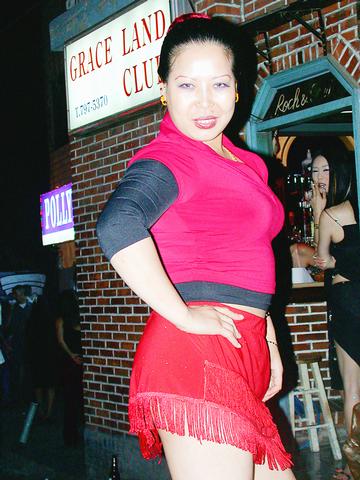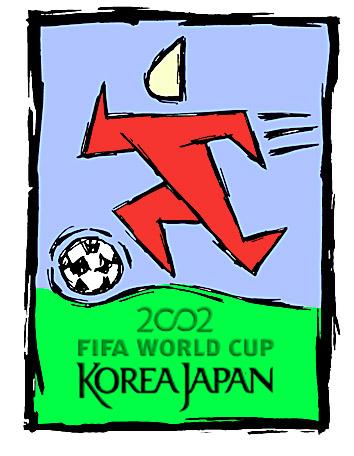Itaewon is Seoul's most famous watering hole and early yesterday morning it was the meeting point for many fans of teams playing first-round games in South Korea, who were looking for a drink and a little action.
Also called "Little America" because it grew around the entrance of the US base at nearby Yongsan, Itaewon is a shopping district with a difference.

PHOTO: JULES QUARTLY, TAIPEI TIMES
In the day there are malls and underground shopping emporiums selling the usual array of goods, but in the evening people come out to play.

Innumerable hole-in-the-wall bars and clubs ply their trade and hundreds of US, Irish, Senegalese and others mixed it up on the drag they call "Hookers' Hill."
As music spilled out of pubs and onto the street, women in skimpy outfits beckoned us in.
"You come here darling, I show you a good time," said Sophia, one of the better-known faces on the Hill, according to a visiting academic who was familiar with the scene.
This "gentleman," who did not want to be named, said that contrary to appearances, the women were not selling sex.
"It's not quite what it seems," he said.
"There are many different levels of girls, but most of them are just attracting men in to drink. Many men come here for sex, but that's not what they get."
Three drinks and some time with a 27-year-old girl called Crystal ran 30,000 won (NT$836), which the visiting academic assured was a very reasonable price.
Crystal said the area had developed to cater primarily to the needs of US soldiers, but it was now popular with all nationalities.
She said many of the girls working the bars were like her and had either been married or had been in a relationship with a foreigner, mostly US servicemen.
"I knew about this area from the newspaper and I came here to get a job because I can speak Eng-lish," she said.
Crystal said she had been working the Hill for three years and enjoyed the work most of the time.
She said it paid around 500,000 won (NT$14,000) a month, although it was possible to earn much more.
"If I like someone and they like me, I take them home," she said.
"People come here for different reasons," she said. "Some people need to talk to somebody because they are far away from home. Some guys need sex, but you can't have sex with just anyone here."
Other sources said Russian girls worked as high-end prostitutes in the area and there was a local drug-dealing network that was run principally by Nigerians.
Every night around 12pm there are patrols of military police to pick up stray or misbehaving servicemen who would otherwise miss curfew, the visiting academic said.
"First they send out the MPs, then the SPs [Shore Police] and then the CPs [Courtesy Police]. It's quite a system," he said.
Crystal said trouble was rare and if it got out of hand the MPs or South Korean police would sort it out. She said most of the bars were owned by women who had saved up some money and borrowed the rest from the bank.
"A long time ago these places were run by gangsters, but that doesn't happen any more," she said.

MORE VISITORS: The Tourism Administration said that it is seeing positive prospects in its efforts to expand the tourism market in North America and Europe Taiwan has been ranked as the cheapest place in the world to travel to this year, based on a list recommended by NerdWallet. The San Francisco-based personal finance company said that Taiwan topped the list of 16 nations it chose for budget travelers because US tourists do not need visas and travelers can easily have a good meal for less than US$10. A bus ride in Taipei costs just under US$0.50, while subway rides start at US$0.60, the firm said, adding that public transportation in Taiwan is easy to navigate. The firm also called Taiwan a “food lover’s paradise,” citing inexpensive breakfast stalls

TRADE: A mandatory declaration of origin for manufactured goods bound for the US is to take effect on May 7 to block China from exploiting Taiwan’s trade channels All products manufactured in Taiwan and exported to the US must include a signed declaration of origin starting on May 7, the Bureau of Foreign Trade announced yesterday. US President Donald Trump on April 2 imposed a 32 percent tariff on imports from Taiwan, but one week later announced a 90-day pause on its implementation. However, a universal 10 percent tariff was immediately applied to most imports from around the world. On April 12, the Trump administration further exempted computers, smartphones and semiconductors from the new tariffs. In response, President William Lai’s (賴清德) administration has introduced a series of countermeasures to support affected

CROSS-STRAIT: The vast majority of Taiwanese support maintaining the ‘status quo,’ while concern is rising about Beijing’s influence operations More than eight out of 10 Taiwanese reject Beijing’s “one country, two systems” framework for cross-strait relations, according to a survey released by the Mainland Affairs Council (MAC) on Thursday. The MAC’s latest quarterly survey found that 84.4 percent of respondents opposed Beijing’s “one country, two systems” formula for handling cross-strait relations — a figure consistent with past polling. Over the past three years, opposition to the framework has remained high, ranging from a low of 83.6 percent in April 2023 to a peak of 89.6 percent in April last year. In the most recent poll, 82.5 percent also rejected China’s

PLUGGING HOLES: The amendments would bring the legislation in line with systems found in other countries such as Japan and the US, Legislator Chen Kuan-ting said Democratic Progressive Party (DPP) Legislator Chen Kuan-ting (陳冠廷) has proposed amending national security legislation amid a spate of espionage cases. Potential gaps in security vetting procedures for personnel with access to sensitive information prompted him to propose the amendments, which would introduce changes to Article 14 of the Classified National Security Information Protection Act (國家機密保護法), Chen said yesterday. The proposal, which aims to enhance interagency vetting procedures and reduce the risk of classified information leaks, would establish a comprehensive security clearance system in Taiwan, he said. The amendment would require character and loyalty checks for civil servants and intelligence personnel prior to